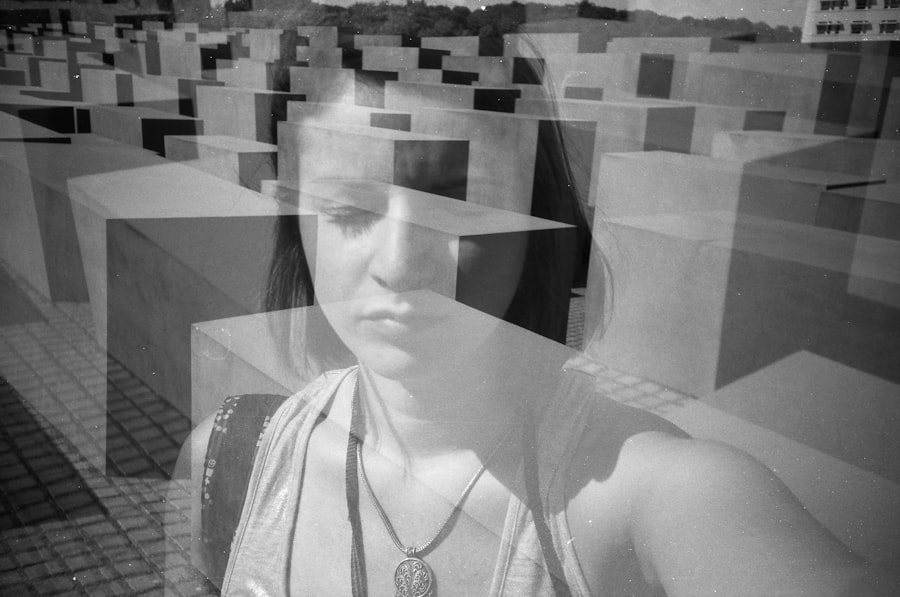Depersonalization is a psychological phenomenon that can leave you feeling detached from your own thoughts, feelings, and sense of self. Imagine looking at yourself in a mirror but feeling as though the reflection staring back is not truly you. This disconnection can be unsettling, as if you are observing your life from a distance rather than actively participating in it.
Many people experience depersonalization at some point in their lives, often during periods of extreme stress or anxiety. However, for some, it can become a chronic condition that significantly impacts daily functioning. When you experience depersonalization, it may feel as though you are living in a dream or that your surroundings are unreal.
This sensation can be disorienting and frightening, leading to feelings of isolation and confusion. You might find it challenging to connect with your emotions or to feel fully present in your own life.
Understanding this phenomenon is crucial for recognizing its effects and seeking appropriate help.
Key Takeaways
- Depersonalization is a mental health condition characterized by feeling detached from oneself or feeling like an outside observer of one’s thoughts, feelings, and actions.
- Derealization is a mental health condition characterized by feeling detached from one’s surroundings, as if the world is unreal or distorted.
- The causes of depersonalization and derealization can include trauma, stress, anxiety, and substance abuse.
- Symptoms of depersonalization and derealization can include feeling emotionally numb, experiencing memory problems, and feeling disconnected from reality.
- Coping strategies for depersonalization and derealization can include therapy, mindfulness techniques, and stress management.
- Amnesia is a condition characterized by partial or complete memory loss, often caused by brain injury, trauma, or neurological conditions.
- Types of amnesia include retrograde amnesia (loss of memories before the onset of amnesia) and anterograde amnesia (inability to form new memories).
- Causes and treatment of amnesia can vary, with treatment options including therapy, medication, and cognitive rehabilitation.
Understanding Derealization
Derealization is closely related to depersonalization but focuses more on your perception of the external world rather than your internal self. When you experience derealization, the environment around you may seem distorted or unreal. You might feel as though you are in a movie or that the world has taken on a surreal quality.
This altered perception can create a sense of detachment from reality, making it difficult for you to engage with your surroundings fully. The experience of derealization can be alarming, as it often leads to confusion and anxiety about what is real and what is not. You may find yourself questioning the authenticity of your experiences or feeling as though you are living in a fog.
This phenomenon can occur in response to overwhelming stress or trauma, and like depersonalization, it can be a symptom of various mental health disorders. Understanding derealization is essential for recognizing its impact on your life and seeking effective coping strategies.
The Causes of Depersonalization and Derealization

The causes of depersonalization and derealization can be complex and multifaceted. Often, these experiences are triggered by significant stressors or traumatic events in your life. For instance, if you have experienced a traumatic incident, such as an accident or loss of a loved one, your mind may resort to depersonalization or derealization as a coping mechanism.
This dissociative response allows you to distance yourself from the emotional pain associated with the event. Additionally, certain mental health conditions can contribute to the development of these experiences. Anxiety disorders, depression, and PTSD are commonly linked to depersonalization and derealization.
Substance abuse can also play a role; for example, the use of hallucinogenic drugs may induce feelings of detachment from reality. Understanding the underlying causes of these phenomena is crucial for addressing them effectively and finding appropriate treatment options.
Symptoms of Depersonalization and Derealization
| Symptom | Description |
|---|---|
| Feeling detached from oneself | A sense of being an outside observer of one’s thoughts, feelings, and body |
| Emotional numbness | Feeling disconnected from one’s emotions or unable to feel emotions |
| Distorted perception of time | Feeling like time is speeding up, slowing down, or not passing at a normal rate |
| Feeling disconnected from surroundings | A sense of unreality or detachment from the environment |
| Memory problems | Difficulty remembering certain aspects of the experience of depersonalization or derealization |
Recognizing the symptoms of depersonalization and derealization is vital for understanding what you may be experiencing. In cases of depersonalization, you might notice feelings of being disconnected from your body or thoughts. You may feel as though you are observing yourself from outside your body or that your emotions are muted or absent.
This disconnection can lead to difficulties in forming relationships or engaging in everyday activities. On the other hand, derealization symptoms often manifest as a distorted perception of your surroundings. You might perceive objects as flat or lifeless, or feel as though time has slowed down or sped up.
These experiences can lead to confusion and anxiety, making it challenging to navigate social situations or even simple tasks. Both depersonalization and derealization can be distressing, and recognizing these symptoms is the first step toward seeking help and support.
Coping Strategies for Depersonalization and Derealization
If you find yourself grappling with depersonalization or derealization, there are several coping strategies that may help you regain a sense of control and connection. One effective approach is grounding techniques, which involve focusing on the present moment and engaging your senses. For instance, you might try to identify five things you can see, four things you can touch, three things you can hear, two things you can smell, and one thing you can taste.
This practice can help anchor you in reality and reduce feelings of detachment. Another helpful strategy is mindfulness meditation. By practicing mindfulness, you can learn to observe your thoughts and feelings without judgment, allowing you to create a sense of distance from distressing experiences.
Engaging in regular physical activity can also be beneficial; exercise releases endorphins that improve mood and reduce anxiety levels. Additionally, seeking support from friends, family, or mental health professionals can provide valuable reassurance and guidance as you navigate these challenging experiences.
What is Amnesia?

Amnesia is a condition characterized by memory loss that can affect your ability to recall past events or form new memories. It is not simply forgetting; rather, it involves a significant disruption in memory function that can stem from various causes. You may find yourself unable to remember important personal information or specific events in your life, which can be distressing and disorienting.
Amnesia can manifest in different forms and degrees, impacting both short-term and long-term memory. The experience of amnesia can vary widely from person to person. Some individuals may have difficulty recalling recent events while retaining older memories, while others may struggle with both short-term and long-term memory loss.
Types of Amnesia
There are several types of amnesia that you may encounter, each with distinct characteristics and underlying causes. One common type is retrograde amnesia, which involves the loss of memories formed before the onset of amnesia. This type often occurs after traumatic events such as head injuries or psychological trauma.
You might find it challenging to recall significant life events or personal experiences that occurred prior to the incident. Anterograde amnesia is another type that affects your ability to form new memories after the onset of amnesia. This condition can result from brain injuries or certain medical conditions that impair memory formation.
You may find it difficult to remember new information or experiences shortly after they occur, leading to frustration and confusion. Understanding these different types of amnesia is crucial for identifying the specific challenges you may face and seeking appropriate treatment options.
Causes and Treatment of Amnesia
The causes of amnesia can vary widely, ranging from physical injuries to psychological factors. Traumatic brain injuries resulting from accidents or falls are common culprits behind memory loss. Additionally, certain medical conditions such as strokes or infections affecting the brain can lead to amnesia.
Psychological factors like severe stress or trauma may also contribute to memory loss through dissociative amnesia, where memories are blocked due to emotional distress. Treatment for amnesia often depends on its underlying cause. In cases where memory loss results from physical injury, rehabilitation therapies may be employed to help restore cognitive function.
Cognitive-behavioral therapy (CBT) can also be beneficial for individuals experiencing psychological amnesia by addressing the emotional factors contributing to memory loss. Support from loved ones plays a crucial role in recovery; creating a safe environment where you feel comfortable discussing your experiences can significantly aid in the healing process. In conclusion, both depersonalization and derealization are complex psychological phenomena that can significantly impact your sense of self and reality.
Understanding their causes, symptoms, and coping strategies is essential for navigating these experiences effectively. Similarly, amnesia presents its own set of challenges related to memory loss that require careful consideration and appropriate treatment options. By seeking support and employing effective coping strategies, you can work toward regaining a sense of control over your mental health and well-being.
Depersonalization-derealization disorder is a complex mental health condition characterized by persistent feelings of detachment from one’s body or surroundings, often leading to significant distress and impairment. An interesting article that delves into the nuances of this disorder, including its relationship with amnesia, can be found on Unplugged Psych. This resource provides valuable insights into the psychological mechanisms and therapeutic approaches associated with depersonalization and derealization. For more detailed information, you can explore the article by visiting Unplugged Psych.
LEARN MORE About Depersonalization & Derealization
FAQs
What is depersonalization?
Depersonalization is a mental health condition characterized by feeling detached from one’s own thoughts, feelings, and sensations. It can make individuals feel like they are observing themselves from outside their body.
What is derealization?
Derealization is a mental health condition characterized by feeling detached from one’s surroundings. It can make individuals feel like the world around them is unreal or distorted.
What is amnesia?
Amnesia is a condition characterized by partial or complete loss of memory. It can be caused by various factors such as brain injury, trauma, or psychological factors.
What are the symptoms of depersonalization-derealization disorder?
Symptoms of depersonalization-derealization disorder include feeling detached from oneself or one’s surroundings, emotional numbness, and a sense of unreality. Individuals may also experience memory problems or amnesia.
What causes depersonalization-derealization disorder?
The exact cause of depersonalization-derealization disorder is not fully understood, but it is believed to be related to a combination of biological, psychological, and environmental factors. Trauma, stress, and anxiety are commonly associated with the development of the disorder.
How is depersonalization-derealization disorder treated?
Treatment for depersonalization-derealization disorder may include therapy, medication, and lifestyle changes. Cognitive-behavioral therapy (CBT) and mindfulness-based approaches have shown to be effective in managing symptoms. Medications such as antidepressants or anti-anxiety drugs may also be prescribed in some cases.
Can depersonalization-derealization disorder be cured?
There is no specific cure for depersonalization-derealization disorder, but with proper treatment and management, many individuals are able to experience significant improvement in their symptoms and quality of life. It is important to seek professional help if you are experiencing symptoms of the disorder.




